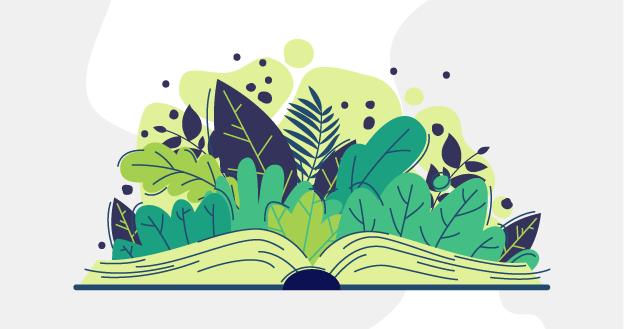Issue 113
Term 2 2020
School libraries and sustainability
Australian Library and Information Association (ALIA) Sustainable Libraries Group coordinator, Katalin Mindum, explores leading a greener school library.

With the current focus on climate change and the impact we are having on the environment, many of us are wondering how we can make a real difference. Libraries are quite naturally places that people turn to for ideas as well as answers. They tend to be positive, proactive and full of amazing, community-focused people who are perfectly placed to lead the way in finding practical solutions to sustainability challenges, both within their schools and in their broader communities.
There seem to be three basic areas in which school libraries could be engaging to help achieve the necessary culture change to enable their immediate and broader communities to work towards more positive environmental outcomes. Firstly, we need to 'walk the talk' and take personal responsibility for the impact of what we do within our own libraries. Secondly, we need to ensure that we support our schools and teachers and empower them to embed environmental sustainability into both the curriculum and their teaching practice. Finally, we can take the initiative to provide opportunities for providing information and education opportunities for our broader communities, either independently or in partnership with other institutions or organisations.
So how can we 'walk the talk'? What do we need to do in order to embrace the challenge both personally and as a group? How do we change the culture of our schools and libraries? Let’s take a single very simple, everyday example. By now we should all be using reusable cups for our morning cafe coffee and refillable water bottles, as a matter of course. But how do we take this to the next level and ensure that our library and other school functions also avoid disposable crockery and cutlery, bottled water and over packaged foods? Having attended several conferences and seminars recently I've noticed some very heartening progress in this direction, but there is still much room for improvement.
Planning responsible catering doesn’t need to be a logistical nightmare and its worth making the effort. Not only is it achievable, but it also sets a precedent for positive culture change towards a more responsible attitude towards sustainability in a practical setting. Whether it is celebrating a colleague's birthday in the staff room, or planning a school trivia night, it just needs leadership and a willingness to make it happen. You don’t need to do it alone. There are organisations that hire out everything from crockery to table linen, at less cost than it would be to buy the plastic equivalent, and some places don’t even require you to return the items washed. It’s well worth investigating.
Within the Australian Curriculum, sustainability is now a cross-curriculum priority. Embedding sustainability concepts and content can be a challenge, but one which the school libraries can assist with. Both the Australian Government Department of Education, Skills and Employment, and the various state education departments have information and program in place to inform and assist with the process. There are also other organisations and bodies with fabulous free online resources.
The websites Eco-Schools Australia and 1 Million Women include ideas and resources that can assist teachers to embed sustainable practices and ideas into their general teaching practice as well as providing ideas for developing education programs for our communities.
Whole-school approaches to sustainability: An international review of whole-school sustainability programs is quite a lengthy document that provides an interesting overview of developments and practices in sustainability programs internationally.
Libraries are trusted to provide current and accurate information, and their staff are knowledgeable and well respected within their communities.
There are some great ideas on the Sustainable Schools NSW website, which includes a lot of very useful information and lists national and local environmental event dates, funding opportunities, and templates for project planning and grant applications.
Libraries are trusted to provide current and accurate information, and their staff are knowledgeable and well respected within their communities. Many have been developing responses to the UN Sustainable Development Goals (SDGs) and working on programs to embed the various SDGs into their outreach and education programs. Depending on the circumstances and existing partnerships that schools have with local public libraries or other organisations, there may be great opportunities to open their doors to the broader community and run programs that include guest speakers and information sessions on aspects of sustainable living, such as organic gardening, recycling, cooking without waste, repair and recycling cafes. There are also opportunities to engage both staff and students in brain-storming ideas around sustainability, recycling, reusing and upcycling, and establishing things like recycling stations for batteries and e-waste, and book swaps.
It seems that the possibilities for programs within your library, your school and your community, are endless and much can be achieved, often without needing a huge amount of money or resources. We just need library people with a passion and a vision for change to step up to the challenge and lead their schools to a better and more environmentally conscious future.
Image credits
Leonid studio/Shutterstock